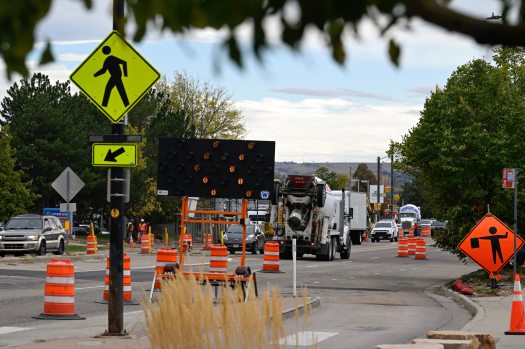UPDATE: The Boulder City Council has just approved a controversial transportation management fee that could generate approximately $6.2 million for critical infrastructure projects. The vote, held on December 7, 2023, resulted in a narrow margin of 6-3 in favor, marking a significant development in the city’s ongoing efforts to address transportation needs.
The newly approved fee will be applied to most privately owned properties in Boulder. Non-residential property owners, including private schools and hospitals, will be charged between $11 and $160 per 1,000 square feet annually, depending on land use. Single-family residences will face an annual fee of $54, while multi-family properties will incur a $42 fee. However, institutions like the Boulder Valley School District and the University of Colorado Boulder are exempt, although they may consider contributing to a city fund.
This decision comes after two previous attempts to implement similar fees faltered in the late 2000s and 2019. Council members supporting the fee, including Ryan Schuchard, Matt Benjamin, and Mayor Aaron Brockett, argue that this funding is essential as costs for infrastructure projects continue to rise. The city currently faces $6.4 million in annual unfunded maintenance needs, which includes $4.2 million for pavement and street safety asset management.
Despite support among some council members, there is significant backlash from the business community and concerns about the fee’s impact on residents. Councilmember Mark Wallach, who voted against the measure, emphasized the lack of adequate outreach to affected property owners, stating, “To say to them, ‘Come to a public hearing, we’re going to discuss how you get your bills’ is not really what they had in mind.” He raised alarms about potential increases in lease prices for renters, a sentiment echoed by Councilmember Taishya Adams, who voiced concerns over the burden this fee may place on residents.
The Boulder Chamber of Commerce has also expressed its discontent with the fee, urging the City Council to adopt a more collaborative approach to funding infrastructure that considers the economic challenges businesses face in the wake of the COVID-19 pandemic. Senior Director of Policy Programs, Jonathan Singer, commented, “We know that there was consideration of this long before Covid, but life significantly changed for residents and businesses since then.”
A motion to delay the implementation of the fee until next year narrowly failed, highlighting divisions within the council. As the city prepares for the final reading of the ordinance, which is expected to pass, discussions surrounding the outreach process and its potential economic ramifications continue to evolve.
This development is critically important for Boulder residents and businesses alike, as the implications of this fee will be felt throughout the community. The council’s decision underscores the urgency of addressing transportation infrastructure, but also raises pressing questions about the balance between necessary funding and the financial realities facing local stakeholders.
As Boulder moves forward, all eyes will be on how this fee will be received by the public and whether it will indeed help alleviate the city’s pressing infrastructure concerns or exacerbate existing economic challenges. Expect more updates as this situation develops.







